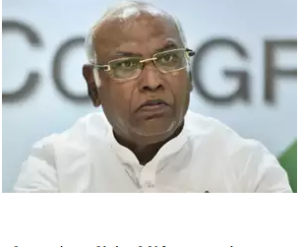BJP In the dynamic landscape of Indian politics, electoral complaints and controversies often serve as catalysts for heightened scrutiny and debate. The recent complaint lodged by the Bharatiya Janata Party (BJP) against Karnataka Minister Kharge adds another layer of complexity to the political narrative of the state. This article aims to dissect the intricacies of the complaint, analyze its potential implications, and evaluate whether it represents genuine electoral concerns or political maneuvering.  for more information click on this link
for more information click on this link
The BJP’s complaint to the Election Commission (EC) against Karnataka Minister Kharge stems from allegations of electoral malpractice and impropriety. At the heart of the matter lies the accusation that Kharge violated the Model Code of Conduct (MCC) during a crucial electoral period. Such allegations strike at the core of democratic principles, highlighting the importance of fair and transparent electoral processes.
Central to the BJP:-
However, it is essential to approach such allegations with a critical eye, considering the broader political context in which they arise. Karnataka, like many Indian states, has long been a battleground for fierce political rivalries, with parties often resorting to various tactics to gain electoral advantage. Against this backdrop, accusations of electoral misconduct can sometimes be weaponized for strategic purposes rather than reflecting genuine concerns about the sanctity of the electoral process. complaint are assertions regarding Kharge’s conduct during campaigning activities. Accusations range from the misuse of government machinery for electoral gains to the dissemination of misleading information aimed at influencing voters. These allegations, if proven true, could significantly undermine the integrity of the electoral process and erode public trust in the democratic framework.
The timing of the BJP’s complaint against Kharge also warrants scrutiny. As the state gears up for crucial electoral battles, including by-polls and local body elections, political actors are eager to gain any advantage they can. In this context, allegations of misconduct against a prominent minister from the opposing camp could serve to tarnish their image and sway public opinion in favor of the accuser.
Furthermore, the polarization that characterizes Indian politics often exacerbates the gravity of such complaints. Supporters of the BJP are likely to view the allegations against Kharge through a lens colored by their political allegiance, predisposed to believe the worst about their ideological opponents. Conversely, supporters of the Congress party, to which Kharge belongs, may dismiss the allegations as politically motivated attacks aimed at delegitimizing their leaders.
Amidst these partisan narratives, it is imperative for the Election Commission to conduct a thorough and impartial investigation into the allegations leveled against Kharge. The EC’s role as the custodian of free and fair elections is paramount, and any indication of electoral malpractice must be addressed swiftly and decisively. Only through transparent and unbiased adjudication can the credibility of the electoral process be upheld and public faith in democracy preserved.
Beyond the immediate ramifications for Kharge and the BJP, the outcome of this electoral complaint could have broader implications for the political landscape of Karnataka. Depending on the findings of the EC’s investigation, the credibility of the Congress party, as well as the BJP’s narrative of good governance and accountability, may be called into question.
Moreover, the manner in which the electorate perceives the handling of such complaints by political parties and institutions like the EC can shape voter behavior in future elections. If voters perceive that electoral complaints are merely tools for political vendettas rather than genuine efforts to uphold democratic principles, it could foster cynicism and apathy towards the electoral process.
In conclusion, the BJP’s complaint against Karnataka Minister Kharge represents a critical juncture in the state’s political trajectory. While allegations of electoral misconduct must be taken seriously and investigated rigorously, it is equally important to guard against the weaponization of such complaints for political gain. As Karnataka navigates the complexities of its electoral landscape, the integrity of its democratic institutions will be tested, and the manner in which they respond to electoral complaints will shape the future of the state’s polity.





